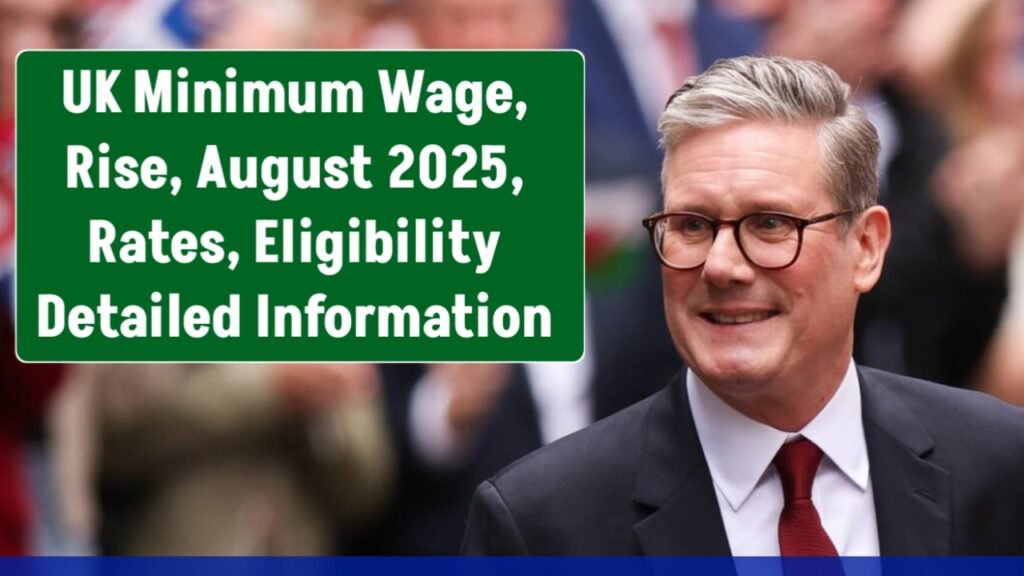The UK’s minimum wage is set to increase again in August 2025, giving millions of workers a pay boost. This rise will impact employees across different age groups and job roles, with new rates set by the government to match the rising cost of living. If you are currently working in the UK or are about to enter the workforce, it’s important to know the updated rates, who is eligible, and how this change will affect your income.
New Rates from August 2025
From August 2025, the National Minimum Wage and National Living Wage rates will rise for all age groups. The government has confirmed that the increase will apply to workers aged 16 and above, with the highest rates going to those aged 23 and over. For example, workers aged 23+ will see their hourly rate increase significantly, meaning higher weekly and monthly pay. This change is part of the government’s commitment to support low-income workers and ensure wages keep up with inflation.
Why the Rise is Happening
The rise in the minimum wage is directly linked to the cost-of-living crisis, which has made everyday expenses such as rent, food, and energy bills more expensive. Economic experts and trade unions have been pushing for a higher wage to help working families manage better financially. By increasing the rates in August 2025, the government aims to reduce wage inequality and support those struggling with rising costs.
Who Will Benefit
This wage increase will benefit a wide range of workers, including retail staff, hospitality workers, care assistants, and part-time employees. Young workers aged 16–20 will also see a noticeable rise, which can help them manage education costs or living expenses. Apprentices will get a boost too, with their minimum hourly rate increasing under the new policy.
Eligibility Rules
To qualify for the new minimum wage rates, you must be classed as a worker and be at least school-leaving age. The law covers most employees in the UK, but there are exceptions, such as self-employed people, volunteers, and members of the armed forces. Casual workers, agency staff, and part-time workers are all entitled to the new rates as long as they have a contract of employment.
Impact on Weekly and Monthly Income
For a full-time worker on a 40-hour contract, this wage increase could mean hundreds of pounds more each year. For example, if you are currently earning £11.44 per hour and the rate rises to £12.10, your weekly pay would go up by more than £26 before tax. Over a year, this could add over £1,300 to your gross income, making a big difference for households struggling to cover bills.
Apprenticeship Rate Changes
Apprentices in the UK often earn less than other workers due to their training status, but in August 2025, their rates will rise too. This means that even in the first year of an apprenticeship, workers will be entitled to a fairer wage. After the first year, apprentices over 19 will move to the higher rate for their age group, further boosting their pay.
Employer Responsibilities
Employers in the UK must follow the new minimum wage rules from the date they come into effect. It is illegal to pay workers less than the official rate. Businesses will need to adjust their payroll systems, inform staff of the changes, and ensure that all wages meet or exceed the new minimum. Failure to comply can lead to penalties, back-pay orders, and reputational damage.
How to Check Your Pay
If you are unsure whether you are being paid correctly, you can check your pay slip and compare your hourly rate with the new government rates. You can also use the UK Government’s online calculator to verify your earnings. If you find you are being underpaid, you have the right to raise the issue with your employer and, if necessary, report them to HMRC.
Possible Effect on Prices
While the wage increase will put more money in workers’ pockets, some economists warn that it could also lead to higher prices for goods and services. This is because some businesses may pass the extra payroll costs onto consumers. However, supporters argue that the benefits of higher wages, such as improved living standards and reduced reliance on benefits, outweigh these potential price rises.
Government Support and Advice
The UK Government has published detailed guidance on the minimum wage rise, including information for workers and employers. They have also launched awareness campaigns to ensure everyone understands their rights. Workers can contact ACAS or HMRC for free advice and help if they face issues related to pay.
Preparing for the Change
If you are an employee, make sure you know the exact date the new rates come into effect so you can check your pay straight away. For employers, it is important to budget for the increased wage bill and communicate openly with staff about the changes.
Final Thoughts
The August 2025 UK minimum wage rise is a welcome change for millions of workers, offering much-needed financial relief at a time when living costs remain high. By knowing your rights and the new rates, you can ensure you are fairly paid and make the most of the increase. For employers, this is also a chance to support staff and improve workplace satisfaction while following the law.
